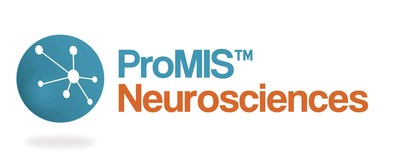ProMIS Neurosciences Designates PMN350 its Second Lead Product for Development in Alzheimer's Disease
TSX: PMN
TORONTO and CAMBRIDGE, MA, May 24, 2017 /PRNewswire/ - ProMIS Neurosciences, a company focused on discovery and development of precision treatments for neurodegenerative diseases, today announced that it has designated PMN350 - a monoclonal antibody (mAb) targeting toxic prion-like forms of amyloid-beta oligomers (AβO) - as the Company's second lead product for Alzheimer's disease (AD).

"We previously demonstrated that PMN310, our first lead product for development in Alzheimer's disease, presents the optimal target profile of selectively binding prion-like forms of AβO, inhibiting both their propagation and neurotoxicity," stated Dr. Neil Cashman, ProMIS Chief Scientific Officer. "We have now achieved a significant development milestone by demonstrating that PMN350, our second AD lead product directed against a different target on toxic AbO, also displays the optimal target product profile in both in vitro and in vivo tests."
The neuroprotective effect of PMN350 was investigated at SynAging, SAS, a leading contract research organization (CRO) specializing in neurodegenerative diseases. Injection of prion-like forms of AβO (also called toxic soluble oligomers) into the brains of mice causes a neurological deficit that can be assessed in a memory-behavior test called novel object recognition. Normal mice exposed to an object remember the familiar object when re-exposed to it and spend more time exploring a newly introduced object. In contrast, AβO-injected mice lose the ability to discriminate between known and novel objects and spend equivalent amounts of time exploring both. Results obtained in this assay showed that administration of PMN350 to mice completely prevented the cognitive impairment caused by toxic oligomers. Furthermore, the observed cognitive benefit of PMN350 was correlated with a statistically significant improvement of two synaptic biomarkers (SNAP25, PSD95) and a biomarker of inflammation (TNFα) measured in hippocampal brain homogenates.
"We are pleased that our propriety discovery engine has produced a second lead product with the potential to treat Alzheimer's," commented Dr. Elliot Goldstein, ProMIS President and CEO. "With two lead development products, PMN310 and PMN350, each selectively addressing a different target (epitope) on toxic prion-like forms of amyloid-beta oligomers, we look forward to initial evaluation of their relative prevalence in cerebrospinal fluid samples from Alzheimer's patients, thereby paving the way for a precision medicine approach to this devastating disease."
About SynAging, SAS
SynAging focuses on disease-inducing protein aggregates which are involved in the earliest stages of proteopathic neurodegenerative diseases, like Alzheimer's and Parkinson's. Proteopathic diseases are those in which certain proteins become structurally abnormal, and thereby disrupt the function of cells, tissues and organs of the body. SynAging is a contract research organization based in Nancy, France, providing highly reproducible drug testing services, employing proprietary protein aggregates to initiate symptoms of neurodegenerative diseases in vitro and in vivo.
For further information please consult the SynAging website at:
www.synaging.com
About ProMIS Neurosciences, Inc.
ProMIS Neurosciences is a TSX listed biotech company (trading symbol: PMN.TO), headquartered in Toronto, Ontario and with offices in Cambridge, Massachusetts. The mission of ProMIS is to discover and develop precision medicine therapeutics for effective treatment of neurodegenerative diseases, in particular Alzheimer's disease and ALS.
ProMIS Neurosciences' proprietary target discovery engine is based on the use of two, complementary techniques. The Company applies its thermodynamic, computational discovery platform—ProMIS™ and Collective Coordinates — to predict novel targets known as Disease Specific Epitopes (DSEs) on the molecular surface of misfolded proteins. Using this unique "precision medicine" approach, ProMIS Neurosciences is developing novel antibody therapeutics and specific companion diagnostics for Alzheimer's disease and ALS. The company has also developed two proprietary technologies to specifically identify very low levels of misfolded proteins in a biological sample. In addition, ProMIS Neurosciences owns a portfolio of therapeutic and diagnostic patents relating to misfolded SOD1 in ALS, and currently has a preclinical monoclonal antibody therapeutic against this target.
The TSX has not reviewed and does not accept responsibility for the adequacy or accuracy of this release. This information release may contain certain forward-looking information. Such information involves known and unknown risks, uncertainties and other factors that may cause actual results, performance or achievements to be materially different from those implied by statements herein, and therefore these statements should not be read as guarantees of future performance or results. All forward-looking statements are based on the Company's current beliefs as well as assumptions made by and information currently available to it as well as other factors. Readers are cautioned not to place undue reliance on these forward-looking statements, which speak only as of the date of this press release. Due to risks and uncertainties, including the risks and uncertainties identified by the Company in its public securities filings, actual events may differ materially from current expectations. The Company disclaims any intention or obligation to update or revise any forward-looking statements, whether as a result of new information, future events or otherwise.
For further information please consult the Company's website at:
www.promisneurosciences.com
Follow us on Twitter
Like us on LinkedIn
SOURCE ProMIS Neurosciences Inc.
Released May 24, 2017